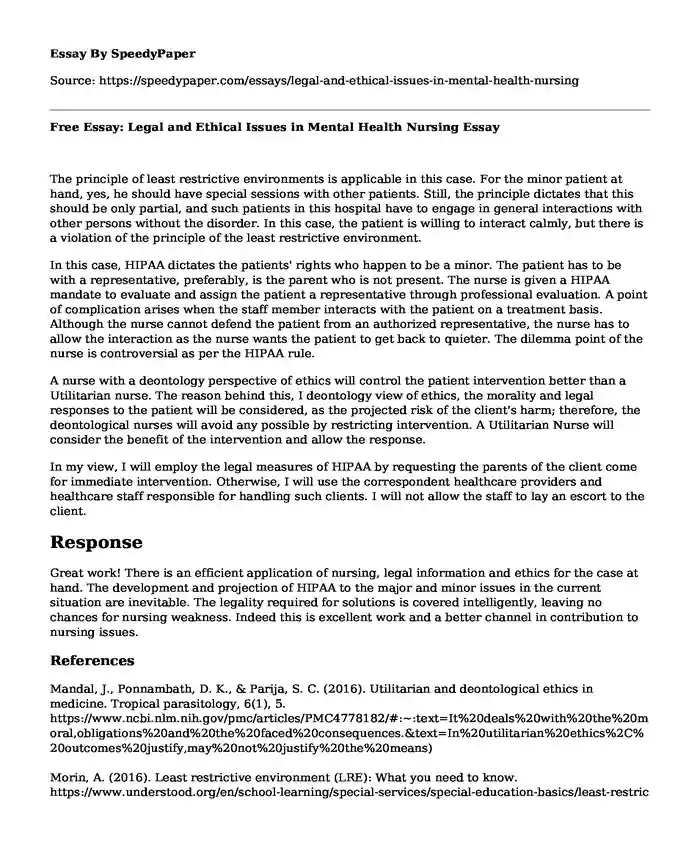
| Essay type: | Rhetorical analysis essays |
| Categories: | Nursing Mental health Ethical dilemma |
| Pages: | 2 |
| Wordcount: | 472 words |
The principle of least restrictive environments is applicable in this case. For the minor patient at hand, yes, he should have special sessions with other patients. Still, the principle dictates that this should be only partial, and such patients in this hospital have to engage in general interactions with other persons without the disorder. In this case, the patient is willing to interact calmly, but there is a violation of the principle of the least restrictive environment.
In this case, HIPAA dictates the patients' rights who happen to be a minor. The patient has to be with a representative, preferably, is the parent who is not present. The nurse is given a HIPAA mandate to evaluate and assign the patient a representative through professional evaluation. A point of complication arises when the staff member interacts with the patient on a treatment basis. Although the nurse cannot defend the patient from an authorized representative, the nurse has to allow the interaction as the nurse wants the patient to get back to quieter. The dilemma point of the nurse is controversial as per the HIPAA rule.
A nurse with a deontology perspective of ethics will control the patient intervention better than a Utilitarian nurse. The reason behind this, I deontology view of ethics, the morality and legal responses to the patient will be considered, as the projected risk of the client's harm; therefore, the deontological nurses will avoid any possible by restricting intervention. A Utilitarian Nurse will consider the benefit of the intervention and allow the response.
In my view, I will employ the legal measures of HIPAA by requesting the parents of the client come for immediate intervention. Otherwise, I will use the correspondent healthcare providers and healthcare staff responsible for handling such clients. I will not allow the staff to lay an escort to the client.
Response
Great work! There is an efficient application of nursing, legal information and ethics for the case at hand. The development and projection of HIPAA to the major and minor issues in the current situation are inevitable. The legality required for solutions is covered intelligently, leaving no chances for nursing weakness. Indeed this is excellent work and a better channel in contribution to nursing issues.
References
Mandal, J., Ponnambath, D. K., & Parija, S. C. (2016). Utilitarian and deontological ethics in medicine. Tropical parasitology, 6(1), 5. https://www.ncbi.nlm.nih.gov/pmc/articles/PMC4778182/#:~:text=It%20deals%20with%20the%20moral,obligations%20and%20the%20faced%20consequences.&text=In%20utilitarian%20ethics%2C%20outcomes%20justify,may%20not%20justify%20the%20means)
Morin, A. (2016). Least restrictive environment (LRE): What you need to know. https://www.understood.org/en/school-learning/special-services/special-education-basics/least-restrictive-environment-lre-what-you-need-to-know
US Department of Health and Human Services. (2018). Summary of the HIPAA security rule. Health Insurance Portability and Accountability https://www.hhs.gov/hipaa/for-professionals/security/laws-regulations/index.html
Cite this page
Free Essay: Legal and Ethical Issues in Mental Health Nursing. (2023, Oct 09). Retrieved from https://speedypaper.com/essays/legal-and-ethical-issues-in-mental-health-nursing
Request Removal
If you are the original author of this essay and no longer wish to have it published on the SpeedyPaper website, please click below to request its removal:
- Essay Example on the Dental Materials Experiment
- Autobiographical Sketch for My Schizoid Personality Disorder, Free Essay
- Free Essay: Pharmacotherapy for Cardiovascular Disorders
- Free Essay Example: Medical Tourism
- Essay on Psychiatric Evaluation: Assessing Ms. Z's Mental Health for Educational Pursuits
- Essay Sample on Hope to High Schoolers During the Pandemic
- Health Promotion Plan on Cessation of Tobacco Smoking - Paper Example
Popular categories




